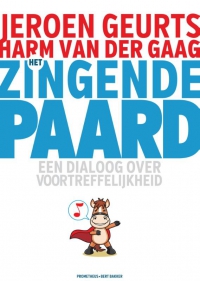How academic excellence resembles a singing horse
Review of a socratic dialogue about excellence
What is excellence? How do we detect it? Can we strive for it? Should we strive for it? “The Singing Horse” (“Het Zingende Paard”) is the report of a socratic dialogue on the notion of excellence between Jeroen Geurts, professor of neuroscience and member of the Dutch Young Academy, and Harm van der Gaag, philosophical counselor. The notion of excellence holds the key to many doors in academia, but is not as self-evident as it is often made to seem…
Socrates & the dialogue
At the market square in ancient Athens Socrates (ca. 400 BC) challenged convictions that his contemporaries took for granted. He questioned their assumptions. As a rule he left his conversation partners in confusion and in full awareness of their ignorance. Plato wrote down many of these dialogues, although he also adapted Socrates’ words to his own purposes.
Nowadays, we understand a socratic dialogue as a conversation in which participants together aim to solve a philosophical question. This is often a lengthy dialogue on an important subject. Participants contribute on their own account and from personal experience. As in ancient Athens, a 21st century socratic dialogue ends in confusion: the self-evident has become less self-evident and the importance of ongoing research has become clear.
Defining excellence?

Het Zingende Paard, een dialoog over voortreffelijkheid
Jeroen Geurts & Harm van der Gaag
Prometheus — Bert Bakker, 2015
ISBN13 — 9789035143357
Het Zingende Paard, een dialoog over voortreffelijkheid
Jeroen Geurts & Harm van der GaagPrometheus — Bert Bakker, 2015ISBN13 — 9789035143357 |
The dialogue between the neuroscientist and the philosopher at the basis of “The Singing Horse” lasted 3 days. Initially, they approach the theme from the perspective of the neuroscientist. In academia the notion of ‘excellence’ is key in the proces of deciding on grants, tenure or tenure track positions and chairs. But soon the natural flow of the conversation broadens the questions, reasons and conclusions far more widely. The two men amongst themselves speak, for instance, about excellent cars.
Many different and purportedly objective criteria are used to establish excellence in science, but there is no unambiguous ruler. Is it the case, then, that you can ‘just see excellence’ when you encouter it, according to your own subjective criteria? No, this intermediate conclusion is untenable and undesireable in practice. From an etymological perspective, the Latin word ‘ex-cellere’ signifies as much as ‘go beyond’, ‘surpass’. This suggests that an excellent researcher outclasses the scale of measurement good, better, best. But can we say that the excellent is best of all, the very best? No again, because this would bring us right back into the, now stretched, scale, whereas ‘ex’ in ‘excellent’ suggests that it really is of another order. Excellent differs fundamentally from just very, very good, it seems. Whether excellence stretches the measuring rod or breaks through the scale remains an open question. The conversationalists and writers of this booklet decide to sleep on it. The dialogue continues the next morning.
The Singing Horse
The title of the book refers to a key passage in the dialogue. The philosopher, who increasingly explicitly takes up the role of ancient Socrates, intervenes in the natural flow of the conversation. He conjures up the notion of the virtuous or exemplary in its Greek sense, delivering a brief lecture on the ancient Greek notion of ‘arêtê’. Interestingly, this Greek term often translated into English as ‘excellence’. Although this turn appears forced, the notion catalyzes the dialogue. An exemplary horse does everything a horse does and can do, as a horse. It cannot sing, but is a good horse. Not necessarily the best horse of all, nor is it necessarily better than other horses. In the best Socratic tradition, this conclusion is confusing: normally we do mean that excellent is something better, or other than ‘just good’.
Geurts and Van der Gaag obviously want to contribute to the general discussion about the role of excellence in current talent selection processes in academia. Their message is that the Dutch research talent selection, with its focus on excellent top-researchers, is like a market for singing horses. Not only do they do all horsey things in an exemplary way, they are also expected to be able to sing. Both the neuroscientist and the philosopher consider this a hazardous state of affairs.
How does this relate to talented early career researchers?
The conceptualization of excellence is often linked to definitions of giftedness, success, and being outstanding. For instance, a themed Coachlink Magazine edition on outstanding talent immediately links “outstanding = excellent = gifted” (april 2014). Only one article in the magazine disagrees: Anna Geburtig argues (p. 66-69) that being gifted is not necessarily the same as being successful, with help of another philosopher (Bas Haring, “Voor een echt succesvol leven”, “For a truly succesful life”, 2007). While success probably is a different matter, excellence, outstanding talent, giftedness are still treated as more or less the same. Of course, in the framework “outstanding = excellent = gifted” immediately a measuring criterion is needed, a norm to compare with others. But think about it: are these notions that stretch the measurements or do they fall outside the scale? If you want to define them, your answer to that question determines a lot.
However, I recommend this booklet not only to ‘theoreticians of excellence’ for a quiet evening read. Also in practice it is useful for personal reflection on your excellence. Many early career researchers struggle with high-strung pressure to perform, of others and of themselves. How wonderful it would be if you only had to be an ‘exemplary’ galloper and plower with no need to be able to sing?
An earlier version of this review appeared in Dutch at IHBV, The gifted adults foundation in The Netherlands (Recensie het zingende paard door claartje van sijl).

Informatieve recensie van schijnbaar boeiend boekje over #excellentie https://t.co/Q0ZYq5X7YW